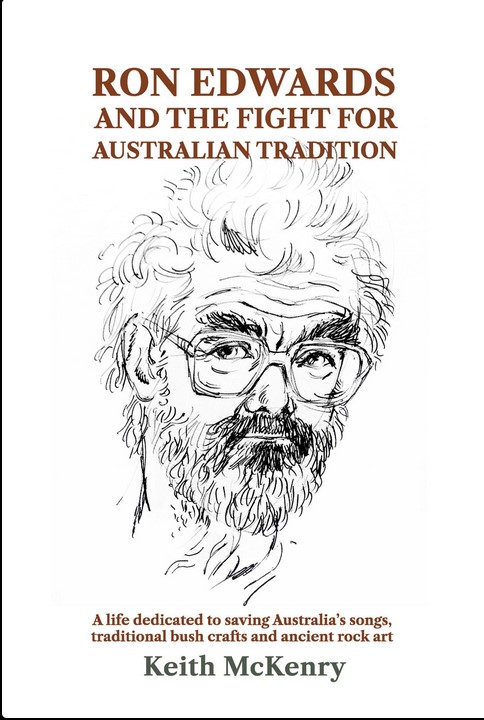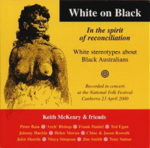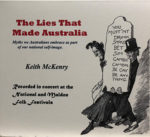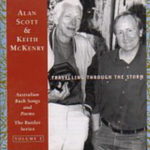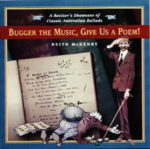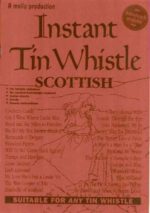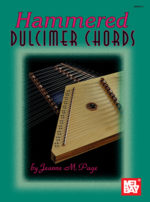Description
About The Book
Ron Edwards and the fight for Australian tradition
by Keith McKenry – TN158 P16-17
Keith McKenry’s long- awaited biography, Ron Edwards, was launched at a special feature concert at the National Folk Festival on Easter Saturday.
The concert traced Ron’s fifty plus year career as a folklore collector and publisher and featured an official launching of the biography by Warren Fahey and performances by Martyn Wyndham-Read, Jan Wositzky, Jessie Lloyd, Chloe and Jason Roweth, Nicole Murray, Bruce Watson, Margaret Walters and Kevin Bradley.
Here by way of preview is a brief synopsis by Keith of Ron’s seminal role in the Australian folk revival.
In the early 1950s, popular wisdom had it that as a ‘young country’, Australia had few if any folk songs and little national culture or tradition.
England was our mother country, that was where our roots and history lay, while for our security and popular culture, we looked increasingly to the United States.
It was into this world that twenty-year old artist, Ron Edwards, embarked with poet, John Manifold, upon a radical project, the production of broadsheets of Australian folk songs, songs that few believed existed.
They called them Bandicoot Ballads, thereby setting in train Australia’s on-going folk song revival.
Initially, Manifold and Edwards had difficulty finding just eight songs with known tunes.
The challenge set Edwards upon a lifetime quest to collect and publish, through his independent Rams Skull Press, songs alive in the memory of ordinary Australians.
He was concerned not for the current generation of Australians, few of whom showed any interest in their evolving folk heritage, but rather for their children, grandchildren and beyond.
In 1954, he published Colonial Ballads, the first book of Australian folk songs with music, and began a series of pioneering folk song chapbooks and songbooks.
A passionately independent free spirit, Edwards moved in 1959, with his family, to far north Queensland to live in thetropical sun, and he made his living painting nudes and bush landscapes for the burgeoning tourist trade.
He discovered, however, locals all around him who knew marvellous old songs.
Determined to ensure these songs were not lost, he became an irrepressible field collector eventually making Cairns, in a strictly numerical sense, the folk song, yarnspinning and bush craft capital of Australia.
Between 1966 and 1971, he published in his monthly magazine, Northern, later National Folk, scores of newly collected songs he had collected in north Queensland.
He discovered too a wealth of ancient Aboriginal rock art, identifying a hundred and seventy separate sites, each of which he documented meticulously.
In the 1970s, Edwards’ research culminated in the publication of The Big Book of Australian Folk Song, The Australian Yarn, and Australian Traditional Bush Crafts, three major works that remain standard references, still the most comprehensive books in their field.
In 1977, Edwards made the first of fourteen trips to China, just after the end of the Cultural Revolution.
He also made five visits to Japan, completing the famed eighty-eight temple Shikoku pilgrimage.
He wrote many books on his travels.
In 1984, fed up with the continuing focus of the government funded Australian Folk Trust on folk song performance and its disinterest in folklore collection, Edwards activated his Australian Folklore Society, a body he established exclusively for folklore collectors, and began his Australian Folklore Society Journal, publishing over the next two decades sixty issues, containing in sum over 700 songs and ballads.
In his later years, Edwards continued to document traditional culture, his work culminating in the 1990s in the
production of his monumental twelve volume index of Australian folk song, with over two thousand entries, and a series of major books on leatherwork and traditional bush craft.
In total, he published over 300 titles, the overwhelming majority of which he wrote and illustrated himself.
Edwards also travelled extensively to remote Aboriginal and Torres Strait Islander communities teaching art and craft and recording the communities’ traditions.
His Songs of the Torres Strait was published in 2001.
Despite contracting a terminal kidney disease, Edwards continued to write and publish prolifically.
His last major work was Aboriginal Rock Art of Cape York and the Gulf Country, a book based on over forty years’ meticulous field research.
He died peacefully in January 2008.
Ron Edwards is a towering figure in the field of Australian folklore.
‘Ron Edwards and the Fight for Australian Tradition’ was published by Australian Scholarly Publishing under its Arcadia imprint, and is available in hardcover with many illustrations, a number in full colour.
Its recommended retail price is $49.95, postage include, and is available from Trad and Now.
